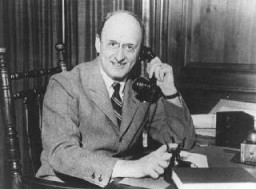<< Previous | Displaying results 1451-1500 of 6719 for "" | Next >>
-
Chinka Schwarzbard Felman
ID CardOne of six children, Chinka was raised in a Yiddish-speaking, religious Jewish family in the town of Ostrow Mazowiecka, where her father was a wine maker. In 1910 she married Ephraim Isaac Felman, and a few years later the couple moved to Sokolow Podlaski, where Chinka helped her husband run a grain business. The Felmans had seven children, two of whom died in infancy. 1933-39: Chinka's husband died in 1935, and she took over the grain business with the help of her children. That same year, her oldest…
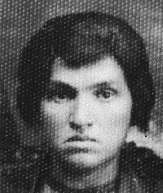
-
Fischel Felman
ID CardFischel was the oldest of seven children in a Yiddish-speaking, religious Jewish family. When he was a small child, his parents moved the family to Sokolow Podlaski, a manufacturing town in central Poland with a large Jewish population of about 5,000. Fischel was sent to study at a religious school. In 1932, when he was 21 years old, Fischel was inducted into the Polish army. 1933-39: After two years in the Polish cavalry, Fischel returned to Sokolow Podlaski, where he apprenticed to become a carpenter…
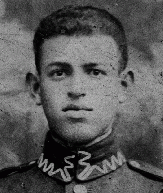
-
Moishe Felman
ID CardThe youngest of seven children, Moishe was raised in a Yiddish-speaking, religious Jewish home in Sokolow Podlaski, a manufacturing town in central Poland with a large Jewish population of some 5,000. Moishe's parents ran a grain business. Moishe attended a Jewish school and began public school in Sokolow Podlaski in 1933. 1933-39: Summer vacation had just finished and 13-year-old Moishe was about to begin another year at elementary school when the Germans invaded Poland on September 1, 1939. German…
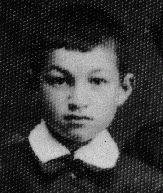
-
Genya Rotenberg
ID CardGenya and her brother, Nahum, were raised by Jewish parents in Lodz, Poland's second-largest city and an industrial center. Before the war, one-third of Lodz's inhabitants were Jewish. Genya's parents placed emphasis on their children's education. 1933-39: In 1939, when Genya was 9, the Germans occupied Lodz. After that, it was forbidden for "Jews, Gypsies and dogs" to be in public places. Since Jews weren't allowed to go to school, her parents arranged to tutor her secretly at home, but she couldn't keep…
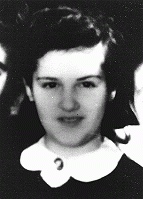
-
Adela Low
ID CardAdela, known as Udl to her family, was one of four children born to a Jewish family in the Polish town of Ulanow. Her father was a landowner and cattle merchant, transporting calves from the Ulanow area for sale in other towns in the region. From the age of 3, Adela attended a private religious school for girls where she learned Jewish history and Hebrew. At age 7 she began public school. 1933-39: Adela came from a charitable family; when her mother baked challah, a special bread for the Jewish Sabbath,…
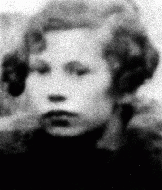
-
Dezider Gruenberger
ID CardDezider was the oldest of three children born to Hungarian-speaking Jewish parents in the city of Kosice in the southeastern part of Czechoslovakia known as Slovakia. As a young boy, he attended a Jewish elementary school. His father was a tailor whose workshop was in the Gruenberger's small apartment. 1933-39: After Dezider finished elementary school, he entered secondary school with a view to going on to the university. The language of instruction was Slovak, and Jews faced no discrimination until…
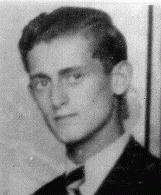
-
Edit Gruenberger
ID CardEdit was the second of three children born to Hungarian-speaking Jewish parents in the city of Kosice in the southeastern part of Czechoslovakia known as Slovakia. She grew up a Czechoslovak citizen. As a young girl, she attended a Jewish elementary school. Her father was a tailor whose workshop was in the Gruenbergers' apartment. 1933-39: After Edit finished elementary school, she entered secondary school. The language of instruction was Slovak and Jews faced no discrimination until November 1938 when…
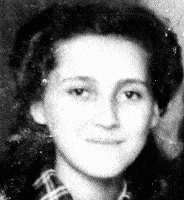
-
Herschel Low
ID CardHerschel was the oldest of four children born to a Jewish family in the Polish town of Ulanow. His father was a landowner and cattle merchant who transported calves from the Ulanow area for sale in other towns. Herschel attended a religious school from the age of 3, and started public school at age 7. 1933-39: Since Herschel was skilled with his hands, his father got him a job weaving reed baskets after he graduated from high school. Herschel was also a member of a Jewish youth organization, Benei Akiva,…
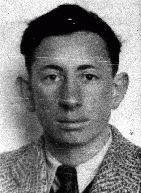
-
Shmuel David Bursztyn
ID CardRaised by Yiddish-speaking, religious Jewish parents in the town of Pultusk in central Poland, Shmuel married in the late 1890s and moved with his wife, Gisha, to the city of Warsaw. Shmuel owned and operated a bakery on Zamenhofa Street. In 1920 the Bursztyns and their eight children moved to larger quarters in a two-bedroom apartment at 47 Mila Street in the Jewish section of the city. 1933-39: By 1939 six of Shmuel's children were grown and on their own. Only his youngest son and daughter still lived…
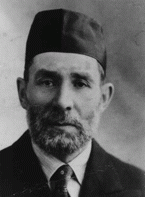
-
Gucia Grosfeld Frydmacher
ID CardGucia was born to middle-class Jewish parents in Radom, an industrial city known for its armaments factory, in which Jews were not allowed to work, and for a leather industry, in which many Jews were employed. Radom had a large and active Jewish community, and at home Gucia's family spoke both Polish and Yiddish. Gucia completed her schooling in Radom. 1933-39: As a young woman, Gucia was introduced to Benjamin Frydmacher, a young Jewish tanner from Lublin who occasionally came to Radom to visit his…
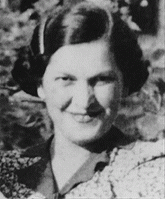
-
Jeno Brieger
ID CardJeno was born into a large, religious Jewish family in the village of Nagyhalasz in northeastern Hungary. The Briegers spoke Yiddish and Hungarian. After Jeno's mother died, his father remarried and the family moved to the town of Nyiregyhaza where his father owned and operated a hardware store. Nyiregyhaza had a Jewish population of 5,000. 1933-39: Jeno was the oldest son in a household of seven children. Nyiregyhaza was a rural town in which people still used horses and buggies. Jeno attended a…
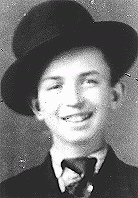
-
Gyula (Gyuszi) Brieger
ID CardGyula was also known as Gyuszi. He was born into a large religious Jewish family in the village of Nagyhalasz in northeastern Hungary. The Briegers spoke both Yiddish and Hungarian. After Gyula's mother died, his father remarried and the family moved to the town of Nyiregyhaza, where his father owned and operated a hardware store. Nyiregyhaza had a Jewish population of 5,000. 1933-39: Gyula was the second oldest son in a household of seven children. Nyiregyhaza was a rural town in which people still used…
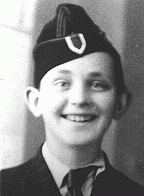
-
Alice Krakauerova Seelenfriedova
ID CardAlice was the third of six children born to Jewish parents in the small Moravian town of Hodonin, where her father ran a dry goods and clothing store. The family spoke both Czech and German at home, and Alice attended a German-language secondary school. After graduating, she married her teenage sweetheart, Otto Seelenfried, who was a chemical engineer. 1933-39: Alice and Otto moved to the town of Jihlava. In 1934 Otto died from a ruptured appendix, and Alice returned to live with her parents in Hodonin.…
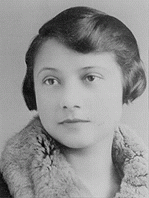
-
Bernard Krakauer
ID CardBernard was one of seven children born to a German-speaking, Jewish family in the small Moravian town of Mikulov in the central part of Czechoslovakia. The family later moved to the town of Hodonin where Bernard opened a dry-goods and clothing store. In 1899 he married Berta Koselova, and the couple had six children. During World War I Bernard served in the Austro-Hungarian army. 1933-39: In 1938 Bernard retired, and since none of his sons wanted to take over the business, Bernard sold it. He, his wife,…
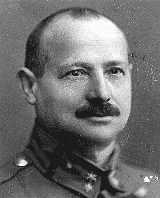
-
Berta Koselova Krakauerova
ID CardBerta was born to a Jewish family. Orphaned when she was a child, she was raised by her Uncle Poldi in Vienna. In 1899 she married Bernard Krakauer, a Jewish businessman from her hometown of Mikulov. As was the custom for orphans, Berta wore a black dress at her wedding. The couple settled in the town of Hodonin, where Bernard opened a dry goods and clothing store. They raised six children. 1933-39: With their children grown, Berta's husband retired in 1938. He sold the business and moved with Berta and…
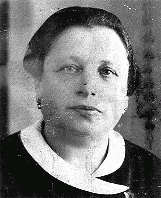
-
Felix Krakauer
ID CardFelix was one of six children born to Jewish parents in a small Moravian town, where his father ran a dry goods and clothing store. The family spoke Czech and German at home and Felix attended German-language schools. As a youth, he belonged to a Zionist club and liked to ski. He graduated from an international trade school in Vienna before settling down in the Moravian capital of Brno. 1933-39: During the 1930s Felix married a Christian woman from the town of Hodonin. When Felix's father retired in 1938,…
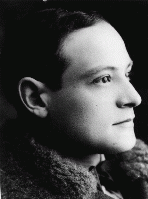
-
Max Krakauer
ID CardMax was the oldest of six children born to Jewish parents in the small Moravian town of Hodonin, where his father ran a dry-goods and clothing store. His family spoke both Czech and German at home, and Max attended German-language schools in Hodonin and Lipnik. He completed his education in 1920. Born with a heart condition, Max lived a sheltered life. 1933-39: Max's father, Bernard, was getting on in years and wanted to retire. Max was not strong enough to take over the business, so the Krakauers sold…
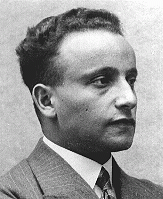
-
Alfred (Fredl) Krakauer
ID CardAlfred was the fifth of six children born to Jewish parents in a small town in Moravia, where his father ran a dry-goods and clothing store. The Krakauers spoke both Czech and German at home. In 1929 and 1930, after graduating from secondary school, Alfred served in the Czechoslovakian army. He enjoyed skiing and also played soccer for the Maccabi Jewish team. 1933-39: Alfred graduated in 1934 from Prague's Industrial School for Art. He became a graphic artist and decided to remain in Prague because of…
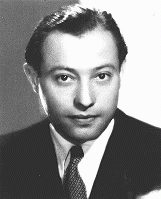
-
Hildegard (Hilda) Krakauerova Nitschkeova
ID CardHilda was the youngest of six children born to Jewish parents in a small Moravian town, where her father ran a dry-goods and clothing store. Her family spoke both Czech and German at home. Hilda was a tomboy when she was growing up, and competed on the Maccabi swim team. She attended a public secondary school in Hodinin, and wanted to pursue a career as a dental technician. 1933-39: In February 1933 Hilda moved to the Moravian capital of Brno where she attended dental school. On December 23, 1935, she…
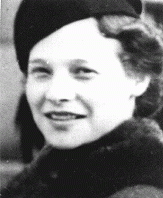
-
Leo Nitschke
ID CardLeo was one of two children born to Jewish parents in the Moravian capital of Brno. When Leo was a child his father died, and Leo and his sister, Edita, were raised by their German-born mother. On November 27, 1931, Leo graduated with a law degree from Brno University. 1933-39: After courting Hilda Krakauerova, a dental technician, Leo married her on December 23, 1935. Leo served as a district judge in Brno and in the town of Postejov, and in 1938 he was appointed judge and secretary to the Moravian…
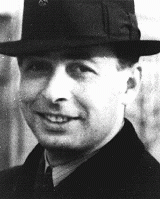
-
Robert Skutecky
ID CardRobert was the second of three children born to Jewish parents in the Moravian capital of Brno, where his father ran a shipping company. Between 1909 and 1920 Robert lived with his widowed grandmother, who resided nearby. He completed secondary school in 1922, and then attended an international trade school in Vienna. Robert earned a doctorate in law from Charles University in Prague in 1930. 1933-39: After apprenticing as a lawyer for five years, Robert finally opened his own practice in Brno in January…

-
Moishe Rafilovich
ID CardMoishe was one of three sons born to Yiddish-speaking Jewish parents in Radom. This industrial city was known for its armaments factories, in which Jews were not allowed to work even though they totaled more than one-fourth of the city's population. When Moishe was young, he left school to apprentice as a women's tailor and eventually became a licensed tailor. He also played soccer for a local team. 1933-39: In 1937 Moishe, by then a master tailor, married another tailor's daughter. The couple had two…
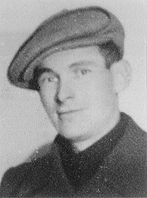
-
Taube Fishman Rosenblat
ID CardTaube, also known as Tola, was born to a Yiddish-speaking Jewish family. Her father worked as a tailor, and a wealthy uncle in Germany helped to support the large family. After finishing public school, Taube trained to be an embroiderer. She fell in love with Itzik Rosenblat, a young man who had first apprenticed with her father in 1925 when Taube was 8 years old. 1933-39: In 1938, after a 13-year courtship much opposed by her family, Taube married Itzik without getting her dowry. The couple lived in an…
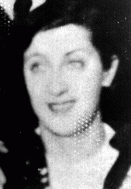
-
Irena Elzbieta Wos
ID CardIrena was the second of four children born to religious Roman Catholic parents in Poland's capital of Warsaw. Irena's father owned a successful textile business. When Irena was 10, her family moved to a comfortable apartment near the Royal Castle and the Vistula River. In 1930 Irena entered a private grade school. 1933-39: At 14 Irena began secondary school. She was a good student and wanted to be a doctor. On September 1, 1939, the day she was supposed to begin the new school year, the Germans attacked…
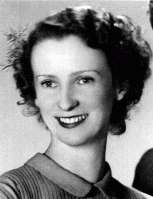
-
Pawel Wos
ID CardPawel, a Roman Catholic, fled to Danzig, Germany, in 1914 to avoid conscription in the Russian army. Since Germany and Russia were at war, Pawel was arrested by the Germans as an enemy alien and sent to work on a farm in northern Germany. He met Anna Szachowska there, and they married in 1918. The couple moved to Warsaw where they raised 4 children. In 1930 Pawel opened a textile business. 1933-39: Despite the Depression, Pawel's business prospered and they expanded their operations. In 1938 some friends…
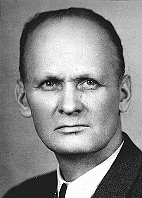
-
Hannah Rosenblat
ID CardHannah was one of six children born to Yiddish-speaking, religious Jewish parents in the town of Zvolen in central Poland. She married Jozef Rosenblat, a Jewish shoemaker also from Zvolen. After living in Warsaw for several years, Hannah and Jozef settled in the industrial city of Radom near their hometown. There, they raised their three sons. 1933-39: When Germany threatened to attack Poland in August 1939, Hannah's youngest son, Herschel, was called up by the Polish army. On September 1, 1939, Germany…
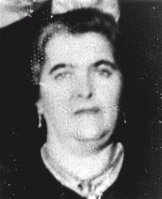
-
Odon Jerzy Wos
ID CardOdon was the third of four children born to Roman Catholic parents in Warsaw, Poland's capital. His father had worked for the Polish merchant marine before starting his own textile business in 1930. When Odon was 8, the family moved to a comfortable apartment located near the Royal Castle and Vistula River. In 1932 Odon began attending grade school. 1933-39: In September 1938 Odon began secondary school. Sensing growing danger from Germany, his father advised him to study German in addition to French. On…
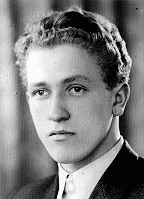
-
Mieczyslaw (Marek) Madejski
ID CardMieczyslaw was the eldest of three sons born to well-to-do Roman Catholic parents in Poland's capital of Warsaw. His father was a real estate developer and his mother was a housewife. Mieczyslaw, or Mieteck as he was nicknamed, began attending public elementary school in 1930 when he was 7 years old. 1933-39: Mieczyslaw's father urged him to study either German or Russian because he thought it was likely that there would be a German or Soviet invasion. Germany invaded Poland on September 1, 1939. During…
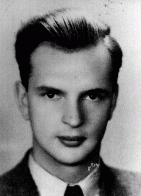
-
Elya Rosenblat
ID CardElya, also known as Eli, was the eldest of three sons born to Yiddish-speaking Jewish parents. When Elya was a child his family moved to the industrial city of Radom, located about 60 miles south of Warsaw. After completing school in Radom, Elya apprenticed to become a women's tailor. Eventually, he became licensed as a master tailor. 1933-39: Elya married in 1936 and had a daughter one year later. He and his wife lived on Zeromskiego Street across from Elya's younger brother, Itzik, who was also a…
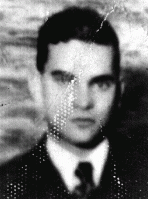
-
Moishe Krol
ID CardMoishe was born to Yiddish-speaking Jewish parents in Radom. The industrial city was known for its armaments factories in which Jews could not work and for its leather industry in which many Jews did. When Moishe was a teenager, he finished school and apprenticed to become a women's tailor. Moishe earned a certificate enabling him to be a licensed tailor and settled down in Radom. 1933-39: By 1939, Moishe had become a master tailor specializing in women's clothes. He remembers local antisemitic…
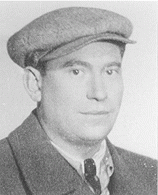
-
Stevo Jugovic
ID CardStevo, who was Serbian Orthodox, was a blacksmith, gunsmith and farmer in the village of Pucari. When he was 20, he went to live in the United States in Minnesota for four years. In 1912 he returned to Pucari, but when his wife and two of his sons died from influenza, he left again for America. In 1923 he returned to Pucari, where he remarried and raised four more children. 1933-39: Stevo had saved some money in the United States, and became one of the wealthiest farmers in his village. He acquired…
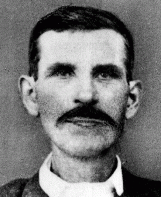
-
Miksa Deutsch
ID CardMiksa was the youngest of four children born to religious Jewish parents. The Deutches lived in the town of Bistrita in Transylvania, a region of Romania that belonged to Hungary until 1918. After 1910, the family lived in nearby Viseu de Sus. In 1922 Miksa moved to Budapest, Hungary, where he and his older brother, Pal, opened a business selling matches. In 1928 Miksa married Kornelia Mahrer. 1933-39: Miksa and Kornelia had three children, whom they raised with a religious education. Miksa and his…
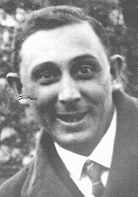
-
Josef Deutsch
ID CardJosef was born to Yiddish-speaking, religious Jewish parents in the town of Viseu de Sus in Transylvania, a region of Romania that belonged to Hungary until 1918. In 1890 he married Emma Geisler from the nearby town of Bistrita. The couple had four children and after 1910 the family lived at #4 Hid Street in Viseu de Sus. Josef was a merchant who owned a stall in Viseu de Sus's public market. 1933-39: By 1939 two of Josef's grown sons had moved to the Hungarian capital of Budapest. Josef and his wife…
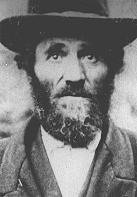
-
Chava Lea Deutsch
ID CardChava Lea was born Emma Geisler to Yiddish-speaking, religious Jewish parents. The Deutsch family lived in the village of Budacu de Sus in Transylvania, a region of Romania that belonged to Hungary until 1918. She grew up in the town of Bistrita. In 1890 she married Josef Deutsch, a salesman from the town of Viseu de Sus, where the couple moved in 1910. Chava and Josef raised four children. 1933-39: By 1939 two of Chava Lea's grown sons had moved to the Hungarian capital of Budapest. Chava Lea and her…
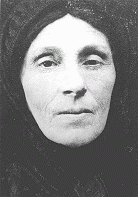
-
Wilma Schlesinger Mahrer
ID CardWilma was the oldest of two daughters born to German-speaking Jewish parents. She married Gyula Mahrer, a Hungarian Jew who had fought in the Hungarian army during World War I. The couple lived in the Hungarian capital of Budapest, where they raised two daughters. The Mahrers lived near their eldest daughter, Kornelia, who had married in 1928. 1933-39: Wilma's first grandchild, Maria, was born on Wilma's 55th birthday. By 1936 Wilma had five grandchildren, three of whom lived in Budapest with her daughter…
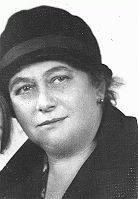
-
Judith Schwed
ID CardJudith was the older of two children born to Jewish parents in the town of Kiskunfelegyhaza in southeastern Hungary. Her mother, Anna, and her mother's sister, Kornelia, were close in age and had a contest to see who would be the first to have a baby. Judith's Aunt Kornelia won the contest and cousin Maria was born in December 1931, just three weeks before Judith. 1933-39: Judith's father had a prosperous wholesale business that sold goose meat, down, feathers and quilts. In 1939, the same year that…
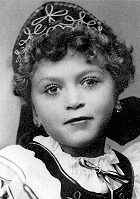
-
Laszlo Schwed
ID CardLaszlo was raised by Hungarian-speaking Jewish parents in the town of Kiskunfelegyhaza in southeastern Hungary. He opened a business selling goose meat, feathers, down and quilts. In 1931 he married Anna Mahrer, from Budapest, and they had a daughter in January 1932. 1933-39: Laszlo and Anna had a second child, a son. They raised their two children in a comfortable home. Kiskunfelegyhaza was located in a rural part of Hungary. In May 1939, the Hungarian government enacted a law that defined Jews as alien…
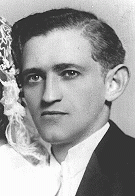
-
Itzik Rosenblat
ID CardItzik, also known as Izak, was one of three sons born to Yiddish-speaking Jewish parents. When Itzik was a young child his family moved to the city of Radom. Itzik left school when he was 11 to apprentice as a women's tailor. After he apprenticed with several tailors in Radom and Warsaw, he went back to school and earned a tailor's license. 1933-39: In 1938 Itzik married Taube Fishman, the daughter of his first employer, after a 13-year courtship much opposed by her family. They lived in Radom, where…
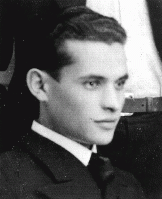
-
Shlomo Szczupakiewicz
ID CardShlomo was the youngest of four brothers born to a Jewish family in the northern Polish town of Malkinia. During World War I, Shlomo served as a male nurse. After the war, he worked as a grain merchant in the Malkinia area, just as his father had. In 1929 he married Pesia Ander, and a year later their first child, Ida, was born. 1933-39: In September 1939, before the invading Germans reached Malkinia, Shlomo fled with his family to the countryside. Exhausted, they returned to their house in Malkinia only…
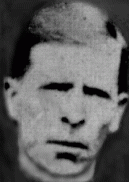
-
Kosta (Kojo) Naprta
ID CardKosta was the oldest of five children born to Serbian Orthodox parents in a poor farming village. Podum was on the slopes of Mount Um in the Croatian part of Yugoslavia. After finishing secondary school, Kosta immigrated to the United States. But when World War I broke out in 1914, he returned to Podum. In 1920 he married Anka, a Serb woman from his village, and they raised eight children. 1933-39: Kosta would read the newspaper to his friends and neighbors who could not read. He supported his family by…
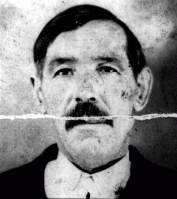
-
Eva Miodelska
ID CardEva was the oldest of four children born to a Jewish family in the central Polish town of Lipsko, about 30 miles southeast of Radom. The family lived at #12 Casimirska Street and Eva attended a private Jewish primary school. Eva's father owned a factory that produced shoes made from leather and cork. 1933-39: In the early 1930s Eva began secondary school in Zwolen, a town about 20 miles to the north. In 1936 her father left for Argentina to settle the estate of his deceased sister. For the two years he…
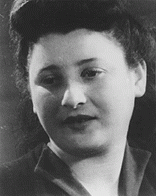
-
Peter Winternitz
ID CardPeter was the oldest of two children born to a Jewish family in the Czechoslovakian capital of Prague, a city with a Jewish community that dated back to the eleventh century. His family lived on Karlova Street in the city's Karlin district. Peter's father owned a wholesale business that sold floor coverings. 1933-39: As a boy, Peter was active in a Zionist sports organization, Maccabi Ha-Zair. The group also helped prepare youth to immigrate to Palestine [Aliyah Bet] by training them in agricultural work.…
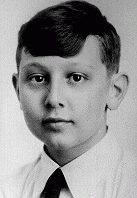
-
Machla Weiner
ID CardMachla was one of six children born to the Sandlers, a Jewish family in the Ukrainian village of Vachnovka. In 1912 Machla married Isaac Weiner, and by the late 1920s they had four sons and two daughters. Their oldest son died of scarlet fever in 1927. Hoping to find employment, Machla's husband moved the family in 1929 to the nearby city of Vinnitsa, which by then was part of the Soviet Union. 1933-39: In the early 1930s a severe famine swept the area. Machla's family survived, but times were hard. Isaac…
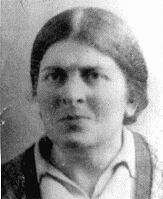
-
Jocheved Kuzda Kasher
ID CardJocheved, or Jadza as she was called at home, was born in the industrial city of Lodz, Poland's second-largest city. Before the war, one-third of Lodz's inhabitants were Jewish. The Kuzdas kept a traditional Jewish home and placed importance on their children's education. Jocheved had two older sisters, Sarah and Regina. 1933-39: Jocheved was 9 when the war broke out in September 1939. Instead of starting school, she stayed at home listening to the bombs exploding. Her father and sister tried to get to…
-
Brandenburg T4 Facility
ArticleBrandenburg was one of six killing centers the Nazis established to murder patients with disabilities under the so-called "euthanasia" program.
-
Refugees Today
ArticleAs of mid-2022, there were about 27 million refugees. Learn more about these refugees, the violence they face, and the global impact of the refugee crisis.
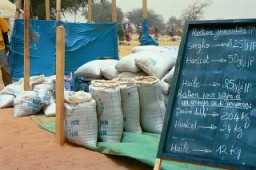
-
Bernburg T4 Facility
ArticleBernburg was the fifth of six centralized killing centers established by German authorities within the context of the Nazi “euthanasia,” or T4, program.
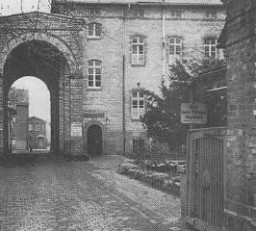
-
Martin Niemöller: "First they came for..."
ArticleLearn about the origins and legacy of Pastor Martin Niemöller's famous postwar words, “First they came for the socialists, and I did not speak out…”
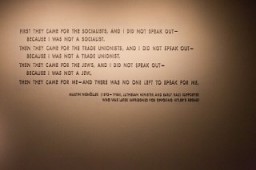
-
Genocide of European Roma (Gypsies), 1939–1945
ArticleLearn about the history of discrimination against Roma in Europe and how the Nazi regime committed genocide against European Roma during WWII.
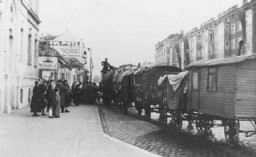
-
Henry Morgenthau Jr.
ArticleHenry Morgenthau Jr had a key role in creating and operating the War Refugee Board, a government agency tasked with rescuing and providing relief for Jews during the Holocaust.
